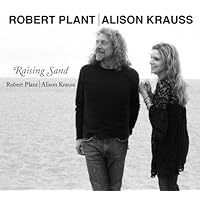
Average Reviews:

(More customer reviews)This is wonderful listening. Even more, it's truly significant. That's in part because of the reaction _ I don't how many times in the last few months I've read about what seems to "critics'' and others to be a truly strange pairing. Something like: "You'd never expect two singers so far apart to team up, but it seems to work.''
That's nonsense (except the part about it working _ it doesn't "seem,'' it's real.) That's because the "critics'' and others put music in boxes and can't understand a pairing of "bluegrass,'' (the quotes are intentional) and heavy metal. This is Americana, but Americana as interpreted by Plant, Krauss and T-Bone Burnett that transcends category in a way that few albums do. Look on top. How many different categories does it rank No. 1. _ Rock, pop, folk, international. That's what music should be but too often isn't because the folks who run record companies and radio stations want to put music in the narrowest possible category.
It's also a breakthrough for all three artists, including Burnett, but especially Krauss, who in her last few albums has boxed herself in with very nice listenable material that's too often predictable. A couple of the albums won Grammys(she has 20)and they're incredibly well produced and performed, but after a while one Robert Lee Castleman song turns into another and the effect is underwhelming.
On this one, she uses all her talents, even, perhaps even as the excellent producer she is _ Burnett clearly took her advice and Plant's on some of the songs. Her country/bluegrass fiddle turns into gypsy violin on "Sister Rosetta,'' producing a haunting effect that's rarely heard in this kind of music.
Beyond that, I've never heard an album where the voices blend so well that it's hard to tell where one stops and the other picks up _ Tom Waits' "Trampled Rose'' is the exemplar of that and the most fascinating and haunting song on the album.
But it's almost all wonderful and it ends with what sounds very much like a little game being played by Burnett and Krauss in particular. The last number begins with Mike Seeger on autoharp leading into a Doc Watson gospel tune. Seeger discovered Elizabeth Cotten, who was his family's housekepper, and he was one of the pioneers who convinced record labels to record roots artists, Watson among them. It's also the most Krauss-like _ it's closest to what she does, right down to using a gospel number to close her albums (and her shows.)
But most of this is totally new territory for both artists. Maybe Krauss should have gone there a decade ago or maybe the timing is perfect. It's one of the few albums _ Luncinda Williams' "Essence'' is another _ that can get away with slow tempos and minor keys on two-thirds of the songs and not sound repetitious or boring.
Again, it's most important because it defies category. Other artists are trying _ Ben Harper and Norah Jones, with whom Krauss guested on a Bonnie Raitt show/CD/DVD are mingling pop, rock, country, gospel and reggae (in Harper's case.) The more the younger generation goes beyong genre and into "just music,'' the better off we'll all be. (Uh, no, Plant, at 59, isn't exactly the younger generation, but he's been looking for new frontiers for a decade or more.)
He's also a Brit and Brits tend to understand American music better than most Americans. In any case, people like Mark Knopfler, Steve Winwood, Van Morrison and even Jagger/Richard stay away from boxes. (And, by the way, I just heard Krauss do a wonderful version of Winwood/Traffic's "I Can't Find My Way Home'' on XM) It was issued three years ago as part of a TV Soundtrack. So yes, she's known for a long time that there's a big wide world of music out there.
This landmark album makes that point even more strongly.
Click Here to see more reviews about: Raising Sand
The musical collaboration of the decade, Raising Sand is the sound of two iconic figures stepping out of their respective comfort zones and letting their instincts lead them across a brave new sonic landscape. Despite hailing from distinctly different backgrounds, Alison Krauss and Robert Plant share a maverick spirit and willingness to extend the boundaries of their respective genres. This spirit, expertly honed by producer T Bone Burnett, has resulted in an album pitched three steps beyond some cosmic collision of early urban blues, spacious West Texas country, and the untapped potential of the folk-rock revolution. Supported by the unparalleled musicianship of Marc Ribot, Dennis Crouch, Mike Seeger, Jay Bellerose, Norman Blake, Greg Leisz, Patrick Warren, and Riley Baugus, Plant and Krauss -- as both solo and harmony vocalists -- tackle an intriguing selection of songs from such tunesmiths as Tom Waits, Gene Clark, Sam Phillips, Townes Van Zandt, The Everly Broth! ers, and Mel Tillis. Raising Sand finds Robert Plant and Alison Krauss exploring popular music's elemental roots while still sounding effortlessly, breath-takingly contemporary. The song "Killing the Blues" is featured in the new JC Penney American Living Campaign.

0 comments:
Post a Comment